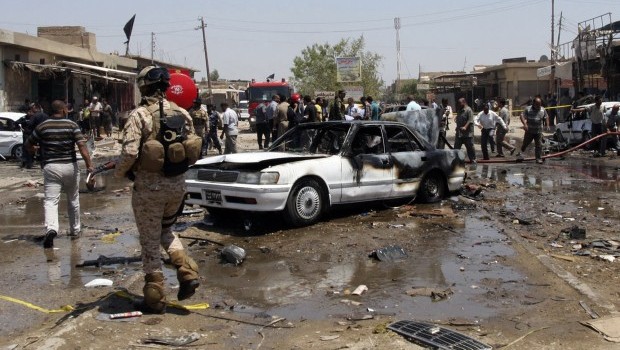
Civilians and security forces gather at the scene of a car bomb attack in the southern Shiite city of Karbala, 50 miles south of Baghdad, Iraq, on Monday, April 29, 2013. Five car bombs exploded Monday in predominantly Shi’ite cities and districts in central and southern Iraq, killing and wounding dozens of people, police said. (AP Photo)
Clashes have increased as the civil war in Syria puts strain on fragile relations between Sunnis and Shi’ites. The tensions are at their highest in Iraq since US troops pulled out more than a year ago.
The latest bout of blood-letting began when security forces raided a Sunni protest camp near Kirkuk last week triggering clashes that quickly spread to other Sunni areas including the western province of Anbar, which borders Syria and Jordan.
Iraq decided on Monday to close a border crossing with Jordan for two days starting on Tuesday due to “organizational issues,” the interior minister said without giving any details.
It is the second time this year that authorities have ordered the closure of the Traibil border post in Anbar, where Sunnis have been protesting against Iraq’s Shi’ite-led government since December.
The demonstrations had eased in the past month, but this week’s army raid on a protest camp in Hawija, near Kirkuk, 170 km north of Baghdad, angered Sunnis and appears to have given insurgents more momentum.
Early on Monday, at least nine people were killed and 40 wounded in two car bomb explosions in Amara, 185 miles southeast of Baghdad.
The first of two blasts in Amara ripped through a market where people were meeting to eat breakfast, and the second hit an area where day laborers were gathering to look for work.
Another car bomb was detonated in a market in Diwaniya, 95 miles south of Baghdad, killing two people, police said.
“I was preparing to go to work when a big explosion shook my house and broke the glass in all the windows,” said witness Widy Jasim. “I ran outside, the explosion was near my house and bodies were everywhere”.
A bomb in a parked car went off near a busy market in Karbala, killing at least three people. A further six people were killed in an explosion near a Shi’ite worship site in Mahmudiya, about 20 miles south of Baghdad.
No group immediately claimed responsibility for the attacks, but car and suicide bombings are trademarks of the Islamic State of Iraq, the Iraqi wing of Sunni Islamist Al-Qaeda which seeks to provoke sectarian conflict.
Violence is still well below its height in 2006–2007, but provisional figures from rights group Iraq Body Count indicate about 1,494 people have been killed so far in 2013.
In Mosul, 240 miles north of Baghdad, gunmen clashed with the army early on Monday, killing two soldiers and wounding three others, military sources said.
A sniper shot dead a soldier and wounded another while they were on patrol in Madaen in eastern Baghdad, police said.
Speaker of parliament Osama Al-Nujaifi, himself a Sunni, proposed an initiative to avoid “the ghost of civil war and sectarian strife,” calling on Prime Minister Nuri Al-Maliki and his Shi’ite-led government to resign, dissolve parliament and prepare for an early parliamentary election.
Iraqi politics are deeply divided along sectarian lines, with Maliki’s government mired in crisis over how to share power among Shi’ite Muslims, the largest group, Sunnis and ethnic Kurds who run their own autonomous region in the north.
